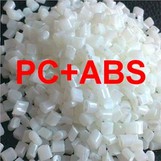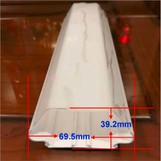Can Modified PC ABS be used in food - contact applications?
As a supplier of Modified PC ABS, I often encounter inquiries regarding the suitability of our products for food - contact applications. This is a crucial question, considering the strict regulations and safety concerns associated with materials that come into contact with food. In this blog post, I will explore the properties of Modified PC ABS, the relevant regulations, and the feasibility of its use in food - contact scenarios.
Understanding Modified PC ABS
Modified PC ABS is a blend of polycarbonate (PC) and acrylonitrile - butadiene - styrene (ABS) that has been enhanced with various additives to improve its performance. This combination results in a material that combines the excellent mechanical properties of PC, such as high impact resistance and transparency, with the good processability and chemical resistance of ABS.
We offer different grades of Modified PC ABS, including General Purpose PCABS Alloy, Flame Retardant Grade PCABS Alloy, and Heat Resistance PCABS Alloy. Each grade is tailored to meet specific application requirements, whether it's for general use, environments where fire safety is a concern, or applications that require resistance to high temperatures.
Key Properties of Modified PC ABS
- Mechanical Strength: Modified PC ABS exhibits high impact strength, which is essential for food - contact applications where the product may be subject to handling and dropping. This property ensures that the containers or equipment made from Modified PC ABS can withstand normal wear and tear without breaking, reducing the risk of contamination from broken parts.
- Chemical Resistance: It has good resistance to a wide range of chemicals, including many common food acids and alkalis. This resistance helps prevent the material from being degraded by the food substances it comes into contact with, ensuring the integrity of the food - contact surface and minimizing the leaching of harmful substances into the food.
- Processability: The blend is easy to process using common plastic manufacturing techniques such as injection molding, extrusion, and thermoforming. This allows for the production of complex shapes and designs, which is beneficial for creating food - contact products like food containers, utensils, and equipment components.
Regulations Governing Food - Contact Materials
In different regions, there are strict regulations in place to ensure the safety of materials used in food - contact applications. For example, in the United States, the Food and Drug Administration (FDA) has established a set of guidelines and requirements for food - contact substances. These regulations specify the types of materials that are allowed, the maximum allowable levels of certain substances that can migrate into food, and the testing methods to be used to ensure compliance.
In the European Union, the European Food Safety Authority (EFSA) plays a similar role. The EU has a comprehensive regulatory framework that covers all aspects of food - contact materials, including plastics like Modified PC ABS. Manufacturers must ensure that their products meet the specific requirements of the EU's food - contact regulations, such as Regulation (EU) No 10/2011, which sets out the rules for plastic materials and articles intended to come into contact with food.


Feasibility of Modified PC ABS in Food - Contact Applications
Whether Modified PC ABS can be used in food - contact applications depends on several factors, including the specific formulation of the material and its compliance with relevant regulations.
- Formulation: The additives used in the modification process are a critical consideration. Some additives may not be suitable for food - contact use due to their potential to migrate into food and pose a health risk. Therefore, it is essential to use additives that are approved for food - contact applications. Our company takes great care in selecting additives that meet the strictest safety standards to ensure that our Modified PC ABS products are suitable for food - contact use.
- Testing and Certification: To demonstrate compliance with food - contact regulations, our Modified PC ABS products undergo rigorous testing. This includes migration testing to determine the amount of substances that may transfer from the material to the food under normal use conditions. Once the products pass these tests, they can obtain the necessary certifications, such as FDA or EU food - contact approvals.
Case Studies
There are already some successful applications of Modified PC ABS in the food industry. For instance, some food container manufacturers have started using Modified PC ABS to produce reusable food storage containers. These containers offer excellent clarity, allowing consumers to easily see the contents inside. They also have good impact resistance, which is important for withstanding the rigors of daily use in the kitchen.
Another example is the use of Modified PC ABS in food processing equipment components. The material's chemical resistance and processability make it suitable for creating parts such as conveyor belts, hoppers, and mixing blades. These components need to be able to withstand the harsh conditions of food processing, including exposure to various food ingredients and cleaning agents.
Advantages of Using Modified PC ABS in Food - Contact Applications
- Cost - Effectiveness: Compared to some other high - performance materials used in food - contact applications, Modified PC ABS offers a good balance between cost and performance. It provides the necessary mechanical and chemical properties at a relatively lower cost, making it an attractive option for manufacturers looking to reduce production costs without sacrificing quality.
- Design Flexibility: As mentioned earlier, the ease of processing of Modified PC ABS allows for greater design flexibility. Manufacturers can create innovative and functional food - contact products that meet the specific needs of consumers and the food industry.
Limitations and Challenges
- Temperature Limitations: Although Modified PC ABS has some heat resistance, it may not be suitable for applications where the material will be exposed to extremely high temperatures for extended periods. For example, it may not be appropriate for use in direct contact with hot cooking oils or in ovens.
- Continuous Monitoring: Even with proper formulation and testing, there is a need for continuous monitoring of the performance of Modified PC ABS in food - contact applications. Changes in food composition, processing conditions, or usage patterns may affect the material's behavior and its compliance with food - contact regulations.
Conclusion
In conclusion, Modified PC ABS has the potential to be used in food - contact applications, provided that it is formulated correctly and complies with relevant regulations. Our company, as a supplier of Modified PC ABS, is committed to producing high - quality products that meet the strict safety standards for food - contact use. We have the expertise and resources to ensure that our products are thoroughly tested and certified, giving our customers peace of mind when using our Modified PC ABS in their food - related products.
If you are interested in exploring the use of Modified PC ABS for your food - contact applications, we encourage you to contact us for more information. Our team of experts can provide you with detailed product specifications, regulatory compliance information, and technical support. We look forward to discussing your specific requirements and working with you to find the best solutions for your business.
References
- Food and Drug Administration (FDA). "Food - Contact Substances Notification Program."
- European Food Safety Authority (EFSA). "Scientific Opinion on the safety of plastic materials and articles intended to come into contact with food."
- Regulation (EU) No 10/2011 of the European Parliament and of the Council on plastic materials and articles intended to come into contact with food.




